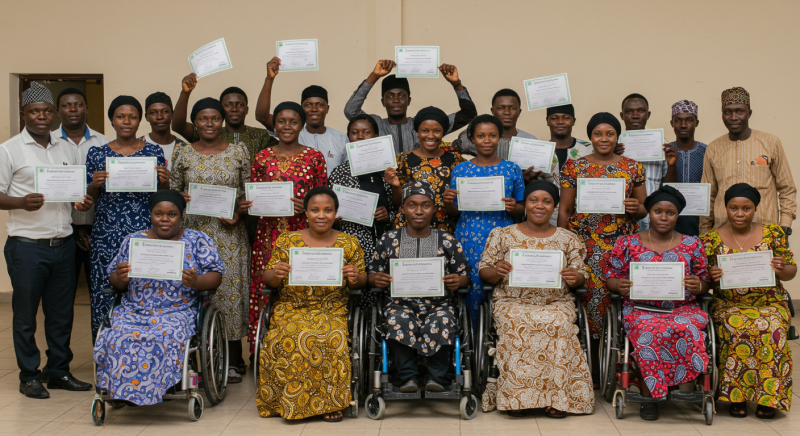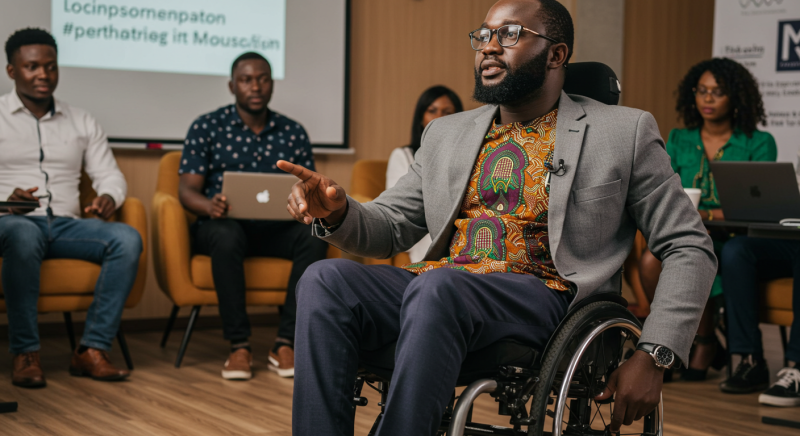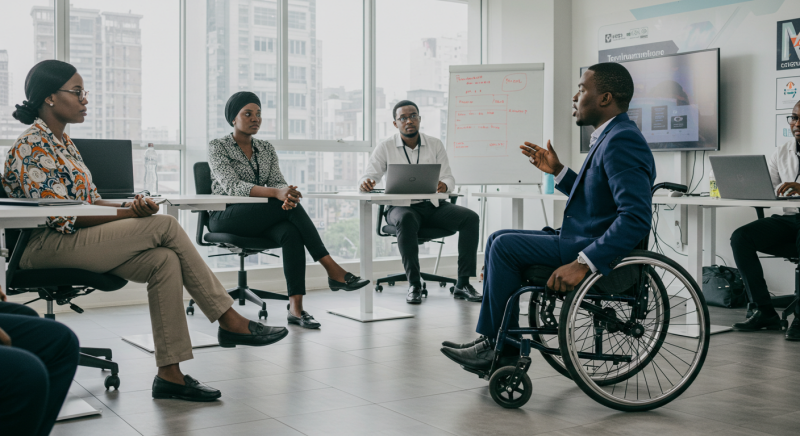Introduction
Every day, thousands of Nigerians with disabilities wake up to extraordinary challenges—barriers in accessibility, pervasive societal stigma, and limited economic opportunities. Yet, hope shines brighter than ever: disability-focused grants for Nigerian startups are emerging as transformative lifelines. In this guide, we explore how these grants are rewriting destinies, empowering entrepreneurs with disabilities to break free from isolation and claim their rightful place in Nigeria’s vibrant startup ecosystem.
Key Takeaways
After reading this guide, you will understand:
-
The landscape of disability inclusion and funding in Nigeria.
-
Leading grant programmes tailored for startups founded by or serving persons with disabilities.
-
Step-by-step strategies to craft winning applications.
-
Practical solutions to overcome common hurdles in the grant process.

Understanding the Landscape
Nigeria is home to an estimated 31 million persons with disabilities—14.9% of the population—facing challenges in education, employment, and healthcare startpage. Despite the 2018 Discrimination Against Persons with Disabilities (Prohibition) Act, many entrepreneurs with disabilities struggle to access capital and networks. Recognizing this gap, international bodies, NGOs, and state governments have launched disability-focused grants for Nigerian startups to nurture inclusive innovation.
Major Disability-Focused Grants for Nigerian Startups
The landscape of disability-focused grants for Nigerian startups is steadily evolving, offering more than just financial lifelines—it’s about unlocking purpose, dignity, and transformative inclusion for millions of Nigerians with disabilities. Below, we dive deep into the most impactful grant opportunities available, who they serve, and how you can tap into these powerful funding streams to scale your mission-driven venture.
Disability Rights Fund (DRF) – A Global Support Network
The Disability Rights Fund (DRF) stands out as one of the most consistent sources of support for disability-led initiatives across the globe, including Nigeria. With annual grant calls specifically designed to empower Disabled Persons’ Organizations (DPOs), the DRF provides disability-focused grants for Nigerian startups that work to influence national legislation, enhance accessibility, or build inclusive businesses.
Grants from DRF come in three tiers: small grants for local impact projects, mid-level coalition grants for partnerships, and national-level grants aimed at systemic change. For instance, some Nigerian recipients have used the funding to create assistive technology labs, while others have launched businesses focused on employment training for youth with disabilities. More on current opportunities can be found at the DRF website.
U.S. Consulate Initiative – Empowering the Underserved
In a remarkable initiative, the United States Consulate in Nigeria recently invested over $30,000 in a project aimed at training and funding 70 entrepreneurs with disabilities in Abia and Edo States. These funds were not only used to deliver training sessions on entrepreneurship and innovation but also to directly seed businesses run by persons with disabilities.
This initiative underscores how disability-focused grants for Nigerian startups are increasingly being recognized as tools for diplomacy and sustainable development. The program’s success was amplified by its focus on women with disabilities and youth, addressing both gender and age-related barriers to entrepreneurship. Full coverage is available at BusinessDay.
Lagos State Empowerment Scheme – Local Government in Action
Closer to home, the Lagos State Office for Disability Affairs (LASODA) has made significant strides in fostering inclusion. In March 2025, LASODA awarded grants and equipment to 78 entrepreneurs with disabilities. These included work tools like sewing machines, POS terminals, and laptops—all carefully selected based on each entrepreneur’s specific trade.
What makes LASODA’s effort special is its holistic approach. Beyond the financial support, the beneficiaries received mentorship and business development guidance. For many, this marked their very first opportunity to break into the formal economy, thanks to disability-focused grants for Nigerian startups offered by a state-level agency. Details of this initiative can be explored on Voice of Nigeria.
Project Enable Africa – Technology Meets Purpose
Project Enable Africa has grown into a beacon of innovation and support for disability entrepreneurs. The 2024 cohort of its Business Support Program trained and funded 20 young entrepreneurs with disabilities. Unlike traditional grants, this programme focused on digital business tools, marketing strategies, and real-world pitching simulations.
Each participant received a grant tailored to their business stage—from idea validation to scaling. It’s a strong example of how disability-focused grants for Nigerian startups can be smart, strategic, and deeply empowering. This initiative proves that with the right support, disability-led ventures can thrive in Nigeria’s digital economy. Read their story on LinkedIn.
Tony Elumelu Foundation – Mainstreaming Inclusive Entrepreneurship
Although not exclusive to persons with disabilities, the Tony Elumelu Foundation (TEF) has shown commitment to diversity in its USD 5,000 seed capital programme. Many disability-focused entrepreneurs have emerged from TEF’s cohorts, using the mentorship and funding to launch impactful businesses, from inclusive fashion brands to sign language translation apps.
The foundation’s commitment to storytelling and ecosystem support makes it a viable platform for startups seeking broader visibility. By submitting a compelling application that highlights your venture’s social impact, you can access one of the most sought-after disability-focused grants for Nigerian startups in Africa’s broader entrepreneurial ecosystem. Learn more from their official page.
African Disability Alliance (ADA) – Regional Cooperation
The African Disability Alliance (ADA) has initiated pan-African funding opportunities that often include Nigerian ventures. These grants focus on capacity building, policy advocacy, and enterprise support. Nigerian startups led by persons with disabilities can benefit from ADA’s extensive regional partnerships and shared learning experiences.
As Nigeria strengthens its role in African innovation, being part of a continental disability inclusion movement amplifies impact. The ADA platform helps startups collaborate beyond borders, making it a vital component in the realm of disability-focused grants for Nigerian startups. Explore their ongoing projects at africandisabilityalliance.org.
Access Bank’s W Initiative – Disability-Friendly Finance
While primarily aimed at women, Access Bank’s W Initiative has been expanding to accommodate intersectional identities, including women with disabilities. The bank has piloted low-interest loan products and grant-like financial supports to support microbusinesses led by this underrepresented demographic.
For Nigerian startups navigating both financial and social marginalization, Access Bank provides one of the few institutional pathways toward formal financial inclusion. In this light, such private-sector innovations complement the growing pool of disability-focused grants for Nigerian startups, offering hybrid capital options that merge business and advocacy.

How to Apply Successfully
Aligning with Funder Priorities
Begin by meticulously reviewing each grant’s strategic objectives to ensure that your vision aligns with the funder’s mission of promoting inclusion and empowerment for persons with disabilities LinkedIn. For programs like the Disability Rights Fund’s small, mid-level, and national coalition grants, demonstrating your commitment to the rights of persons with disabilities under the Convention on the Rights of Persons with Disabilities (CRPD) strengthens your application’s alignment Disability Rights Fund. When targeting corporate programs such as Access Bank’s W Initiative, emphasize how your startup fosters both economic sustainability and social impact for entrepreneurs with disabilities, resonating with their women-empowerment agenda Access Bank.
Crafting a Clear Statement of Need and Project Description
Articulate a strong statement of need by vividly describing the challenges faced by Nigerians with disabilities in accessing economic opportunities and how your innovative solution addresses these gaps Funds for NGOs. Use authoritative data—such as Nigeria’s 14.9% disability prevalence rate—to substantiate the urgency and scale of the problem you intend to solve OHCHR. Embed testimonials, community feedback, or case studies to humanize the issue and create an emotional resonance that underscores why your project is essential nedcresourcecentre.org.
Developing a Detailed Budget and Justification
Present a comprehensive budget that itemizes every expense category—personnel, equipment, materials, overhead, and contingencies—to demonstrate financial transparency and rigorous planning Funds for NGOs. Provide justifications for each line item by linking costs directly to project activities and outcomes, ensuring that reviewers understand how each expense drives impact PandaDoc. Illustrating cost-sharing mechanisms or co-funding partnerships further underscores your startup’s resourcefulness and long-term viability trailblazerinitiative.org.ng.
Setting SMART Goals and Measurable Objectives
Define goals that are Specific, Measurable, Achievable, Relevant, and Time-bound to provide clear benchmarks for success and accountability Funds for NGOs. Break down each goal into quantifiable objectives—such as increasing employment placements for persons with disabilities by a defined percentage within 12 months—to enable precise tracking and reporting PandaDoc.
Leveraging Partnerships and Networks
Collaborating with Disabled Persons’ Organizations (DPOs) and advocacy groups amplifies both credibility and access to stakeholder networks, demonstrating a collective approach to inclusion Disability Rights Fund. Engaging academic institutions or technology hubs can provide technical expertise and mentorship, enriching your startup’s capacity and signaling a sustainable support ecosystem learningforfunders.candid.org. Highlighting memoranda of understanding or letters of support from reputable partners can significantly bolster your application’s trustworthiness trailblazerinitiative.org.ng.
Emphasizing Sustainability and Impact Metrics
Outline a clear roadmap for sustaining project activities beyond the grant period, including diversified revenue streams, cost-recovery models, or subsequent funding pipelines Investopedia. Specify key performance indicators—such as the number of assistive devices distributed or income growth for beneficiaries—that will be regularly monitored and reported Funds for NGOs.
Demonstrating Organizational Capacity and Track Record
Showcase your team’s expertise by detailing relevant qualifications, past project successes, and governance structures that ensure effective grant management LinkedIn. Applying fundamental proposal writing principles—such as selling your idea convincingly and avoiding rushed or incomplete submissions—reinforces the professionalism of your application conbio.org. Including audited financial statements, organizational charts, and descriptions of internal controls further instills confidence in your capacity to manage grant funds responsibly Investopedia.
Tailoring Each Application to the Grant
Customize every application by mirroring the funder’s language, referencing their strategic goals, and explicitly addressing selection criteria outlined in their guidelines nedcresourcecentre.org. Avoid generic proposals; instead, highlight unique aspects of your initiative—such as specialized assistive technologies or targeted mentorship programmes—that resonate with the specific demographic or thematic focus of each grant programme Funds for NGOs.
Writing a Compelling Narrative
Craft an engaging proposal narrative that weaves data, personal stories, and clear outcomes to connect both intellectually and emotionally with reviewers nedcresourcecentre.org. Use concise, jargon-free language, supplemented by visuals like infographics or charts, to make complex information accessible and memorable PandaDoc.
By integrating these strategies into your application process, your venture will stand out in the competitive field of disability-focused grants for Nigerian startups, paving the way to secure the resources needed to drive inclusive innovation and social impact.

Challenges and Solutions
Entrepreneurs with disabilities often face inaccessible infrastructure, bias, and limited networks UON Journals. To overcome these barriers:
-
Advocate for reasonable accommodations in incubators and co‐working spaces.
-
Seek mentorship from disability champions in the tech and social sectors.
-
Utilize digital platforms for remote collaboration, reducing physical access challenges.
Conclusion
From grassroots NGOs to international donors, the landscape of disability-focused grants for Nigerian startups is expanding rapidly. By understanding available programmes, tailoring your application, and forging strategic partnerships, you can unlock vital resources to drive innovation and inclusion. The time to act is now—your venture can be the next success story transforming Nigeria’s startup ecosystem.
FAQ
Q1: Who qualifies for disability-focused grants for Nigerian startups?
A: Eligibility varies, but most grants target startups led by persons with disabilities or ventures that directly improve accessibility and inclusion for PWDs.
Q2: When are applications typically due?
A: Deadlines differ; check each grant’s official site. DRF small grants often open annually between Q1 and Q2, while government initiatives may align with international observances like World Labour Day.
Q3: Are there non-financial supports included?
A: Yes. Many programmes, including the Tony Elumelu Foundation and DRF, offer mentorship, networking, and capacity‐building workshops alongside seed funding.
Q4: Can I apply for multiple grants simultaneously?
A: Generally yes, provided you meet each grant’s specific criteria and tailor applications accordingly.
Q5: How can I increase my chances of success?
A: Focus on clear impact metrics, collaborate with DPOs, and provide a compelling narrative that highlights both social and commercial viability.
read more
Digital Skills in Nigeria: Top Online Courses & IT Certifications for 2025
